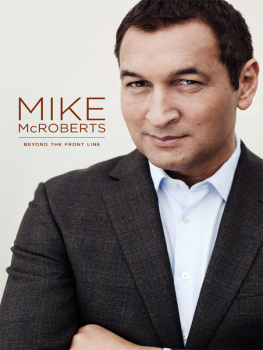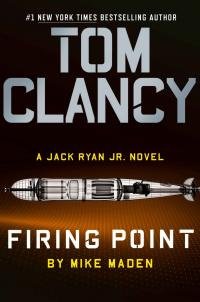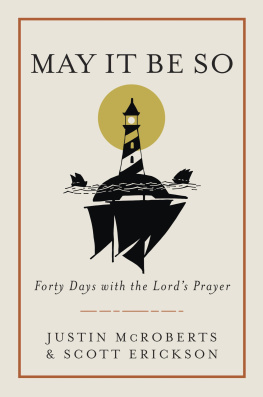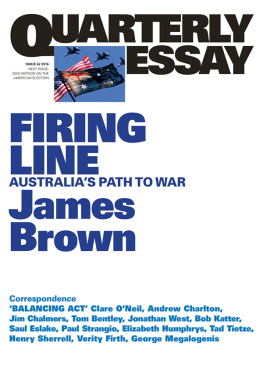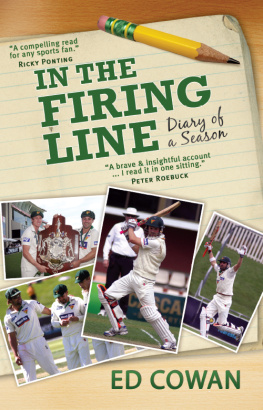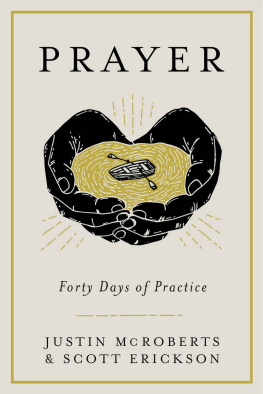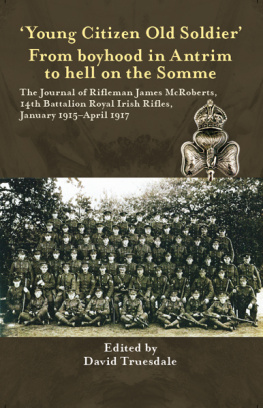McRoberts - Mike McRoberts: Beyond the Firing Line
Here you can read online McRoberts - Mike McRoberts: Beyond the Firing Line full text of the book (entire story) in english for free. Download pdf and epub, get meaning, cover and reviews about this ebook. year: 2011, publisher: HarperCollins Publishers, genre: Detective and thriller. Description of the work, (preface) as well as reviews are available. Best literature library LitArk.com created for fans of good reading and offers a wide selection of genres:
Romance novel
Science fiction
Adventure
Detective
Science
History
Home and family
Prose
Art
Politics
Computer
Non-fiction
Religion
Business
Children
Humor
Choose a favorite category and find really read worthwhile books. Enjoy immersion in the world of imagination, feel the emotions of the characters or learn something new for yourself, make an fascinating discovery.
- Book:Mike McRoberts: Beyond the Firing Line
- Author:
- Publisher:HarperCollins Publishers
- Genre:
- Year:2011
- Rating:4 / 5
- Favourites:Add to favourites
- Your mark:
- 80
- 1
- 2
- 3
- 4
- 5
Mike McRoberts: Beyond the Firing Line: summary, description and annotation
We offer to read an annotation, description, summary or preface (depends on what the author of the book "Mike McRoberts: Beyond the Firing Line" wrote himself). If you haven't found the necessary information about the book — write in the comments, we will try to find it.
Mike McRoberts: Beyond the Firing Line — read online for free the complete book (whole text) full work
Below is the text of the book, divided by pages. System saving the place of the last page read, allows you to conveniently read the book "Mike McRoberts: Beyond the Firing Line" online for free, without having to search again every time where you left off. Put a bookmark, and you can go to the page where you finished reading at any time.
Font size:
Interval:
Bookmark:

For Ben and Maia
T he life of a television reporter and presenter can be a strange one. There are those who want to put you on a pedestal, and others who cannot wait to kick it out from underneath you. Perhaps there is an assumption that because you put your face on the telly each night you must be narcissistic and completely self-regarding.
This is simply not the case amongst the television reporters and presenters I know and whose work I admire. They are more likely to see their visibility as a necessary evil of bringing the stories that need to be told to the public, as they bridge the gap between the world at large and the individual worlds of their viewers.
Far from breeding contempt, familiarity is the lifeblood of television news. News networks all around the world trade on their viewers engagement with correspondents they feel they know and trust. As I have increasingly put myself into stories over the years, I hope I have done so not in an egocentric way, but in one that provides context, perspective and greater accessibility for the viewer.
My trademark beige foreign correspondent garb has been the source of much amusement over the years, particularly to my colleagues. But it has become somewhat synonymous with what I do and the places I go. I remember waiting at the airport to catch a flight to whatever crisis was unfolding, dressed in my uniform, and being approached by someone, asking, alarmed: Oh my God, whats happened?
Some call it, pejoratively, parachute journalism reporters dropping into conflicts or disasters. Whatever your view on that and you will soon see mine there are good reasons why we do it, and it works for us. Our viewers do not just like us reporting at the worlds biggest news events: they have come to expect it.
Frequently I have been the only Kiwi journalist in those situations, often anchoring the news as well as reporting. It is an extension of TV3s longstanding philosophy of only employing presenters who are journalists. And it has been a bit of a game-changer in New Zealand television, extolled in one promotional campaign slogan: He doesnt just read the news, he gets it. I think it appeals to our countrys hands-on, resourcefulness ethic; we are a nation that values hard work.
And there is something uniquely New Zealand, too, about the way my colleagues and I have covered these stories, which I hope you will appreciate. I am not sure if it is the tight budgets, our consequent inventiveness, or even the unwavering optimism of our goals, but it makes for rich story-telling material.
Often what you see on the six oclock news is only part of the story, given the constraints and purpose of a news bulletin. This book takes you beyond the sound-bites and strictly formatted bulletins to the stories behind and beyond the front line.
Writing this book has been a cathartic experience. I have been forced to go back and articulate thoughts and feelings I had in some cases either forgotten about or chosen not to remember. Some of it has been a surprise even to those closest to me.
Clearly my reporting from conflict zones forms a large part of the book, but it has also been a great opportunity to illustrate some of the other work I have done, and reflect on the wonderful people who have helped me achieve it.
I have never characterized myself as a war correspondent; it just doesnt sit well with me. Personally I find war deplorable, especially in the way it debases the human spirit. However, it is the human reaction to these situations that drives me to cover them. I am a people-person and I love telling human stories, and so often the unlikeliest and most powerful of those come from conflict or disaster zones. I think viewers connect with the people in those stories, and through them appreciate the wider issues.
Going into war or disaster zones and making people aware of what is happening is, I think, one of the more noble forms of journalism. Whether it is bringing pressure to bear on warring parties to spare the lives of innocents or summoning help for a population stricken by drought, they are powerful stories for a reason: their ability to create change. And therein lies the privilege of what I do.
At the beginning of 2009 the conflict between Israel and Hamas had escalated into full-blown war. Hamas fired hundreds of Qassam rockets into Israeli territory. In retaliation, the Israeli Defense Force launched a three-week bombing campaign and invasion of the Gaza strip. More than 1,000 civilians were killed.
I was on holiday at the time, watching it unfold, and finally succumbed: I needed to be there. We timed our trip around the likelihood of a ceasefire, so that we would also be able to get into Gaza and see the effects of the war. I sat down my children, Ben and Maia, to explain why I was cutting short our summer break. And to defuse their concern about the danger, I told them that by reporting on what was happening, hopefully myself and other foreign journalists could put pressure on Hamas and the Israeli Defense Force to agree to a ceasefire and prevent further loss of innocents lives. They nodded their heads in agreement.
Our plan worked beautifully, and after only a couple of days on the ground in Israel a truce was called. That night I rang home and got Ben on the phone. He had watched the news and excitedly said to me: Hey, Dad, well done you got a ceasefire.
Youthful enthusiasm and family bias aside, I hope that what I do a bit of which you will see in the pages to come will make my children proud.
Christchurch and Japan, 2011
Christchurch, 2011
O ver the past decade of covering wars and some of the worlds worst natural disasters, I have often been asked how I deal with the experiences when I return home. How do you switch off from what youve seen and carry on with normal life? While it is true that I have witnessed some horrific things, and seen first-hand the tragic consequences that devastation man-made or otherwise can wreak on a population, I have found it relatively easy to keep home life and these events separate. The simple truth of it is that those things happen overseas, not at home, and more often than not New Zealand could not be further away from it.
That tidy theory came crashing down at 12.51pm on Tuesday, 22 February 2011. The 6.3 magnitude earthquake centred just 2 kilometres from the port town of Lyttelton, and 10 kilometres from Christchurch felt from the outset like a major catastrophe. And it was happening in the city I grew up in.
From the early reports of buildings collapsing in the central business district (CBD), combined with the timing of the earthquake in the middle of the day it was clear there would be a loss of life, the likes of which most New Zealanders had never seen before.
I was at home in Auckland when the first messages came through. It was a sickening feeling, hastily packing my bag while also trying to contact my family. Apart from a sister living in Brisbane, all of my family still live in Christchurch, and I have extended family there, too a grandmother, uncles, aunties, cousins, nieces and nephews. None of my messages or telephone calls had been answered as I raced to the airport. I knew the telephone network in Christchurch would be overloaded, and I kept reminding myself of that as I constantly checked for replies.
Auckland airport was chaotic. No aircraft were flying anywhere, as the air traffic control base in Christchurch which monitors the entire nation was down. It seemed that even when flying was restored it would be hours, maybe even a day, before civilian flights would be landing in Christchurch. Veteran producer Keith Slater, colleague John Campbell and I ran through the options. We had the offer of a chartered jet that could get us to Timaru, but then we would need to make the two-hour journey back to Christchurch. There was a helicopter flying to Darfield, but the flight time was five hours, and being a chopper would be far more susceptible to the weather.
Font size:
Interval:
Bookmark:
Similar books «Mike McRoberts: Beyond the Firing Line»
Look at similar books to Mike McRoberts: Beyond the Firing Line. We have selected literature similar in name and meaning in the hope of providing readers with more options to find new, interesting, not yet read works.
Discussion, reviews of the book Mike McRoberts: Beyond the Firing Line and just readers' own opinions. Leave your comments, write what you think about the work, its meaning or the main characters. Specify what exactly you liked and what you didn't like, and why you think so.

